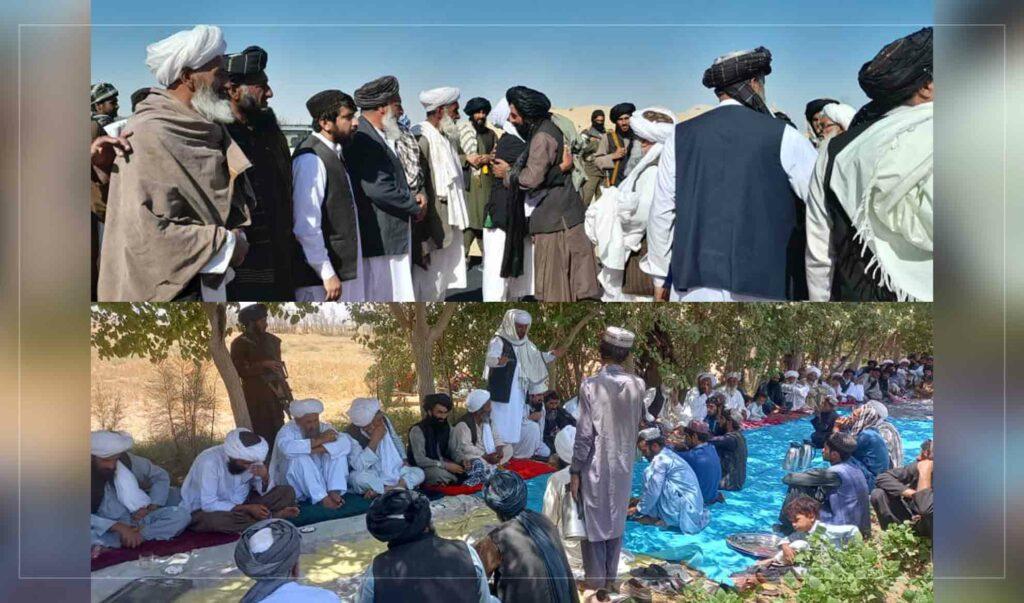ZARANJ (Pajhwok): Tribal Jirgas in western Nimroz province have helped resolve 200 disputes in past three years, an official said on Monday.
One of these Jirgas has helped addressd a fresh case of enmity through bringing reconciliation between two tribes, the dispute between the two sides had caused a murder as well.
The officials added that most of the resolved feuds were caused due to land ownership disputes which sometimes turned violent and resulted in fatalities to one or both sides.
A member of one disputed side said that peace and tranquility existed in reconciliation not in seeking revenge.
Maulvi Gul Ahmad Ahmadi, one of the local influential persons, told Pajhwok Afghan News, that an enmity emerged between Noorzai and Sultanzoi tribes due to their difference over an issue which then led to the death of an individual from one side.
Ahmadi said: “Three months ago during Eid-ul-Fitr on a rainy day a youth Sakhi Jan from the Sultanzoy tribe was crossing the road at high car-speed splashed dirty water on another youth from the Noorzai tribe, this youth asked not splashing dirty water and this issue led to a clash between the two sides, a large number of people from both tribes arrived at the scene and the clash turned violent which led to the stabling of a youth from Noorzai tribe, later security forces arrived at the site of the clash and arrested people from both sides.”
After that both sides of the clash lived in fear and even some of the families left the province for other destinations, as the tribal elder got involved in the case, a a significant progress was made and peace was brought between the involved sides and the enmity ended.
A tribal elder of the Noorzai tribe, Adam Khan Noorzai emphasized the role of religious scholars and other tribal elders in peace and reconciliation between these tribes and said: “Even though we lost a victim (Sakhi Jan), to this enmity as the other side and tribal elders proposed peace to us, we exempted them and there is no more chance to grudge because we believe that there is no joy or peace in revenge.”
Over 200 enmities settled in the past three years through tribal Jirgas
An official of the Vice and Virtue and complaints department Ehsanullah Ehsan says: “Since the takeover of the power by the Islamic Emirate of Afghanistan (IEA) in the country, the government has adopted an effective policy to resolve two or four decades-long feuds by referring them to the Jirga of tribal elders because such cases take a very long time to be decided in the courts and the result of such solutions are also not so favorable for the involved parties. So a commission referred such issues to the commission of complaints in Vice and Virtue department to be decided with the help of tribal elders.”
Referring to the effective role of tribal Jirga in solving such issues, Ehsan accepted that even four such files were referred in one day to a shared commission of Vice and Virtue department and tribal elders for solution.
Ehsan said: “The commission had leveled even some big issues and called the process successful, as an instance he pointed to a 40 year old enmity between two families in which seven people were killed from both sides, but the commission succeeded to settle the feud.”
He said, so far over 200 such different cases had been settled to peace among the families during the past three years since the takeover by the government of the IEA.
Maulvi Gul Ahmad Ahamdi, who had played an important role in solving such cases, said: “The Jirga represent a cultural way of the people in Afghanistan for resolving the disputes in which the religious scholars and other elders participate and discuss solutions.”
During the past several years, many such issues had been resolved among the people and enmities ended between the families or tribes of this country, Ahmadi said.
As an instance, he mentioned: “A huge dispute between two parties in Khashrud district which claimed two lives was also resolved after lengthy discussions between the tribal elders and a number of provincial council members.”
To resolve or level such issues, they had traveled to different districts of Nimroz or even to other neighboring provinces to resolve feuds among the people, he said.
According to the source most of the feuds emerged from land ownership disputes Maulvi Rahmatullah, a prayer leader in Zaranj city and a member of the provincial council, also described the role of tribal Jirga as crucial in resolving feuds and said the scholar’s provincial council, in agreement with local officials and elders, have always played a significant role in resolving ethnic conflicts, and even provincial judges have shared some cases with them to be resolved through tribal Jirga.
As he also played his role in resolving many enmities, he said: “There was an active case about a feud in a local court, as the officials of the court referred it to the council of tribal elders, it was leveled to peace in a matter of two hours with the satisfaction of both sides.”
Rahmatullah believed that the custom of Jirga in Afghanistan had existed since ancient times too many such cases had been processed during the past three years.
Aw/nh
Views: 157









GET IN TOUCH
NEWSLETTER
SUGGEST A STORY
PAJHWOK MOBILE APP